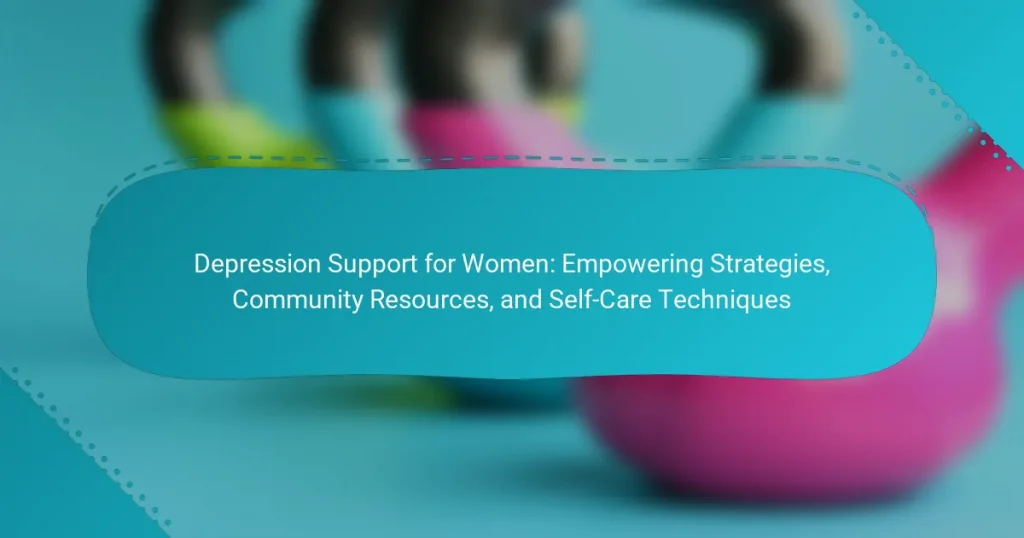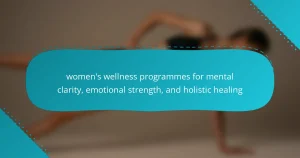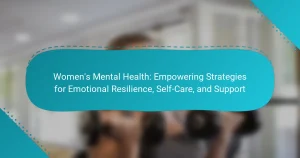Women often face unique challenges when dealing with depression, including societal stigma and emotional barriers. This article explores empowering strategies for coping, highlights community resources tailored for women, and offers effective self-care techniques. Recognizing symptoms and building support networks are crucial steps in enhancing overall well-being. Engaging with local resources and practicing mindfulness can significantly improve mental health outcomes for women.
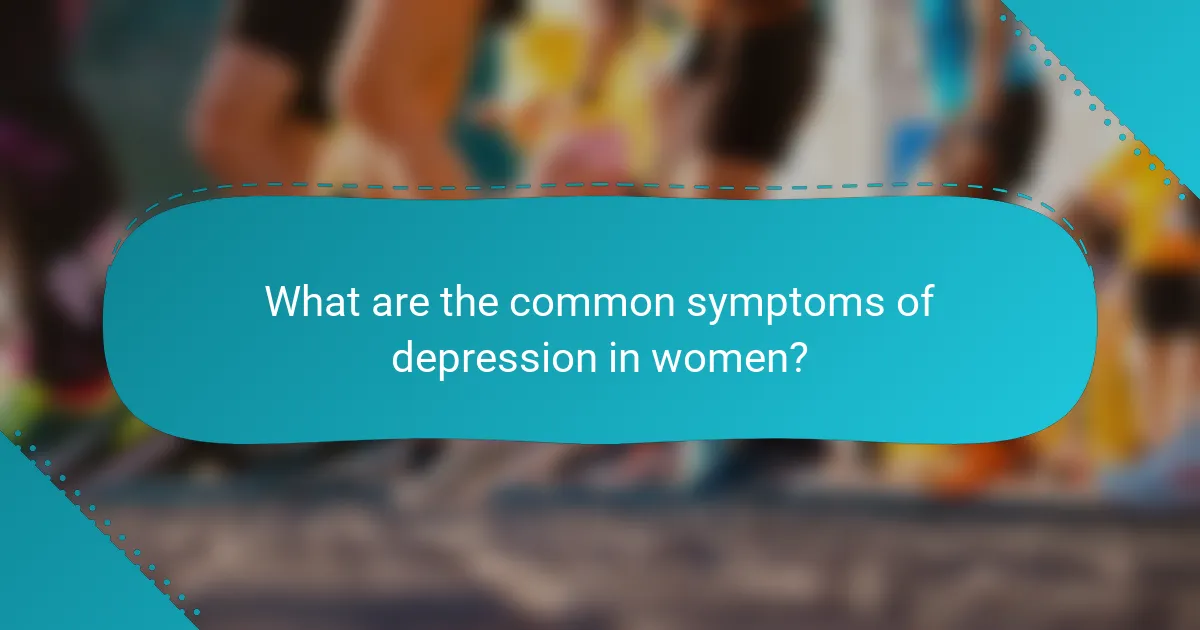
What are the common symptoms of depression in women?
Common symptoms of depression in women include persistent sadness, fatigue, changes in appetite, sleep disturbances, feelings of worthlessness, and difficulty concentrating. These symptoms can significantly impact daily life and relationships. Women may also experience physical symptoms such as headaches or stomach issues. Recognizing these signs is crucial for seeking appropriate support and resources.
How does depression manifest differently in women compared to men?
Depression manifests differently in women compared to men, often influenced by biological, psychological, and social factors. Women may experience more intense emotional symptoms, such as sadness and feelings of worthlessness, while men might exhibit irritability and anger.
Research indicates that hormonal fluctuations, particularly during menstruation, pregnancy, and menopause, can significantly impact women’s mental health. Women are also more likely to seek help and utilize support networks, which can enhance their recovery.
In contrast, men often display depression through externalizing behaviors and may be less likely to acknowledge their feelings, leading to underdiagnosis. Community resources tailored for women, such as support groups and counselling, can empower them to manage their depression effectively.
Self-care techniques, including mindfulness and physical activity, are crucial for women coping with depression, promoting emotional resilience and overall well-being.
What are the underlying causes of depression in women?
Depression in women often stems from a combination of biological, psychological, and social factors. Hormonal changes, such as those occurring during menstruation, pregnancy, or menopause, can significantly impact mood. Additionally, women may experience higher rates of trauma, stress, and societal pressures, contributing to their vulnerability. Research indicates that women are twice as likely as men to be diagnosed with depression, highlighting the need for targeted support strategies. Community resources, such as support groups and therapy, alongside self-care techniques, can empower women to manage their mental health effectively.
How do hormonal changes impact women’s mental health?
Hormonal changes significantly impact women’s mental health, often leading to depression. Fluctuations in hormones, such as oestrogen and progesterone, can trigger mood swings, anxiety, and depressive symptoms. Research indicates that women are more susceptible to depression during hormonal transitions, such as puberty, menstruation, pregnancy, and menopause. These phases can exacerbate existing mental health issues or create new challenges.
Effective strategies for managing depression include seeking community support, engaging in self-care practices, and exploring therapeutic options. Community resources, such as support groups and counselling services, provide essential connections and understanding. Self-care techniques, including regular exercise, mindfulness, and healthy nutrition, empower women to improve their mental well-being.
Addressing hormonal changes with professional guidance can enhance mental health outcomes. Women experiencing significant mood changes should consult healthcare providers to explore treatment options tailored to their unique needs.
What role does societal pressure play in women’s depression?
Societal pressure significantly contributes to women’s depression by fostering unrealistic expectations and standards. Women often face immense pressure to conform to societal norms regarding appearance, career success, and family roles. This can lead to feelings of inadequacy and low self-esteem, exacerbating depressive symptoms. Research indicates that women are more likely to experience depression when they perceive a gap between their actual lives and societal ideals. Additionally, the stigma surrounding mental health can prevent women from seeking help, further entrenching their struggles. Empowering strategies, such as community support and self-care techniques, can mitigate these effects and promote resilience.
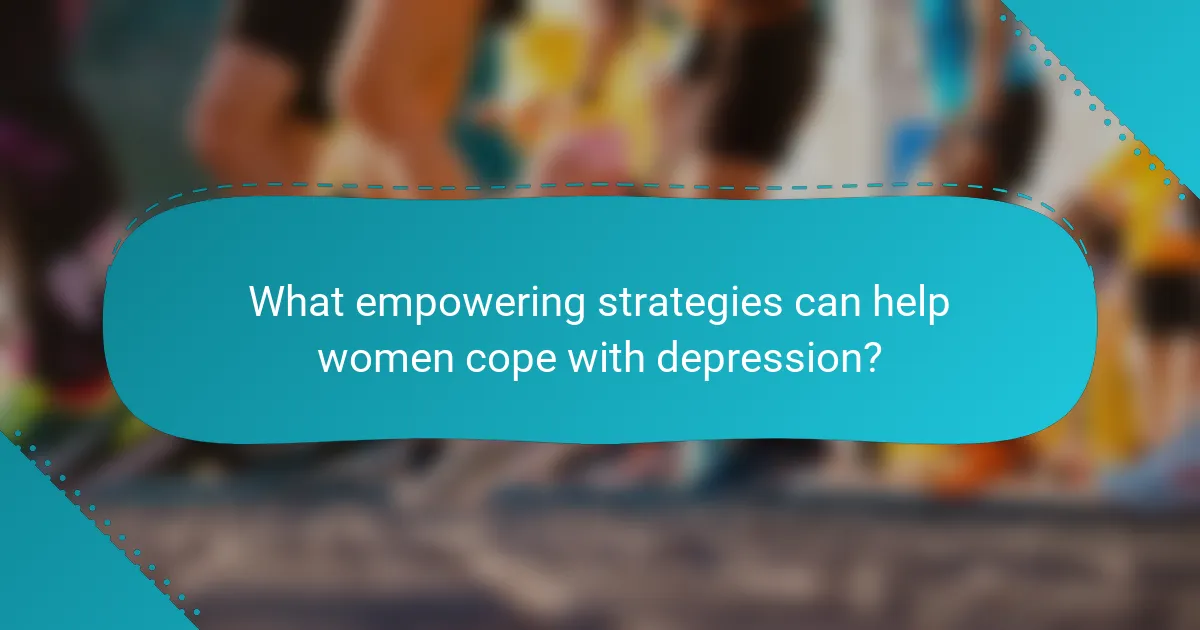
What empowering strategies can help women cope with depression?
Empowering strategies for women coping with depression include building strong support networks, practicing mindfulness, and engaging in regular physical activity. Community resources like support groups and mental health services enhance these strategies. Self-care techniques such as journaling and creative expression also play a crucial role in managing symptoms.
How can cognitive behavioural therapy (CBT) benefit women?
Cognitive behavioural therapy (CBT) can significantly benefit women by providing effective strategies to manage depression. CBT helps women identify negative thought patterns and replace them with positive ones, leading to improved emotional well-being.
Research indicates that women often face unique stressors related to societal roles, family responsibilities, and hormonal changes. CBT equips them with coping mechanisms tailored to these challenges. Additionally, group therapy sessions can foster community support, enhancing motivation and reducing feelings of isolation.
CBT also emphasizes self-care techniques, such as mindfulness and relaxation exercises, which can further alleviate symptoms of depression. By integrating these practices, women can cultivate resilience and improve their overall quality of life.
What role does physical activity play in alleviating depression?
Physical activity plays a crucial role in alleviating depression by boosting mood and enhancing overall well-being. Regular exercise releases endorphins, which are natural mood lifters. Studies indicate that even moderate physical activity can significantly reduce depressive symptoms. For women, engaging in group exercises or community sports fosters social connections, further enhancing emotional support. Incorporating physical activity into daily routines can lead to lasting improvements in mental health.
Which types of exercises are most effective for mental health?
Aerobic exercises, strength training, and yoga are most effective for mental health. These activities enhance mood, reduce anxiety, and promote emotional resilience. Aerobic exercises, such as running or cycling, release endorphins, improving overall well-being. Strength training builds confidence and combats depressive symptoms. Yoga fosters mindfulness, reducing stress and enhancing emotional regulation. Incorporating these exercises into daily routines can significantly support women’s mental health.
How can mindfulness practices enhance emotional resilience?
Mindfulness practices enhance emotional resilience by promoting awareness and acceptance of emotions. They help women manage stress and reduce symptoms of depression. Regular mindfulness techniques, such as meditation and deep breathing, can lead to improved emotional regulation and greater self-compassion. Studies show that mindfulness can decrease rumination, a common issue in depression, thereby fostering a more positive outlook. Engaging in mindfulness within supportive communities further amplifies these benefits, creating a network of encouragement and shared experiences.

What community resources are available for women seeking support?
Local community resources for women seeking support for depression include counselling centres, support groups, hotlines, and wellness programmes. Many organisations provide tailored services addressing women’s unique mental health needs. For example, the National Alliance on Mental Illness offers resources specifically for women, emphasizing peer support and education. Additionally, local health departments often host workshops focused on self-care techniques and empowerment strategies. Engaging with these resources can foster a sense of community and provide effective coping mechanisms.
How can support groups provide assistance to women with depression?
Support groups offer vital assistance to women with depression by fostering a sense of community and shared understanding. They provide emotional support, enabling women to express feelings in a safe space. Participants often share coping strategies, which can enhance resilience and self-care practices. Furthermore, these groups can connect women to local resources, such as mental health professionals and wellness programmes. Engaging in support groups can significantly reduce feelings of isolation, promoting overall mental health and well-being.
What local organisations focus on women’s mental health?
Local organisations focusing on women’s mental health include community support groups, therapy centres, and advocacy organisations. These entities provide resources like counselling, workshops, and peer support to help women manage depression effectively. Examples include the Women’s Mental Health Network and local chapters of the National Alliance on Mental Illness, which offer tailored programmes for women. Access to these resources empowers women to adopt self-care techniques and develop coping strategies, enhancing their mental well-being.

What self-care techniques are effective for managing depression?
Effective self-care techniques for managing depression include mindfulness practices, regular physical activity, and social engagement. Mindfulness techniques, such as meditation and deep breathing, help reduce stress and improve emotional regulation. Regular exercise releases endorphins, enhancing mood and energy levels. Connecting with supportive friends or communities fosters a sense of belonging and reduces feelings of isolation. Journaling can also serve as a valuable tool for self-reflection and processing emotions. Incorporating these strategies into a daily routine can significantly improve overall well-being for women facing depression.
How can journaling improve mental health for women?
Journaling can significantly improve mental health for women by providing a safe space for self-expression and reflection. It helps process emotions, reduce stress, and enhance self-awareness. Studies show that expressive writing can lower symptoms of depression and anxiety. Additionally, journaling fosters a sense of community when shared with others, promoting connection and support. This practice encourages women to explore their thoughts and feelings, leading to better emotional regulation and resilience.
What dietary changes can support mental wellness?
Incorporating dietary changes can significantly enhance mental wellness in women dealing with depression. Focus on whole foods, including fruits, vegetables, whole grains, lean proteins, and healthy fats.
1. Omega-3 fatty acids: Found in fish, flaxseeds, and walnuts, these can help reduce depressive symptoms.
2. B vitamins: Foods rich in folate, such as leafy greens and legumes, support brain health.
3. Antioxidants: Berries and dark chocolate can combat oxidative stress, which may influence mood.
4. Probiotics: Yogurt and fermented foods enhance gut health, linked to improved mental health.
5. Hydration: Adequate water intake is essential for cognitive function and emotional regulation.
6. Limit processed foods: Reducing sugar and refined carbs can stabilize mood and energy levels.
Which nutrients are essential for brain health?
Essential nutrients for brain health include omega-3 fatty acids, antioxidants, vitamins B, D, and E, and minerals like magnesium and zinc. Omega-3 fatty acids support cognitive function and mood regulation. Antioxidants protect against oxidative stress, while B vitamins are crucial for neurotransmitter synthesis. Vitamin D influences mood and cognitive health, and magnesium aids in brain function. Zinc plays a role in neurogenesis and synaptic plasticity.
How important is sleep hygiene in managing depression?
Sleep hygiene is crucial in managing depression, as it significantly impacts mood and overall mental health. Good sleep practices, such as maintaining a consistent sleep schedule and creating a restful environment, can enhance sleep quality. Research indicates that poor sleep exacerbates depressive symptoms, leading to a cycle of worsening mental health. Practicing effective sleep hygiene can serve as a unique strategy for women seeking to empower themselves in their depression management. Prioritising sleep can improve emotional resilience and support overall well-being.
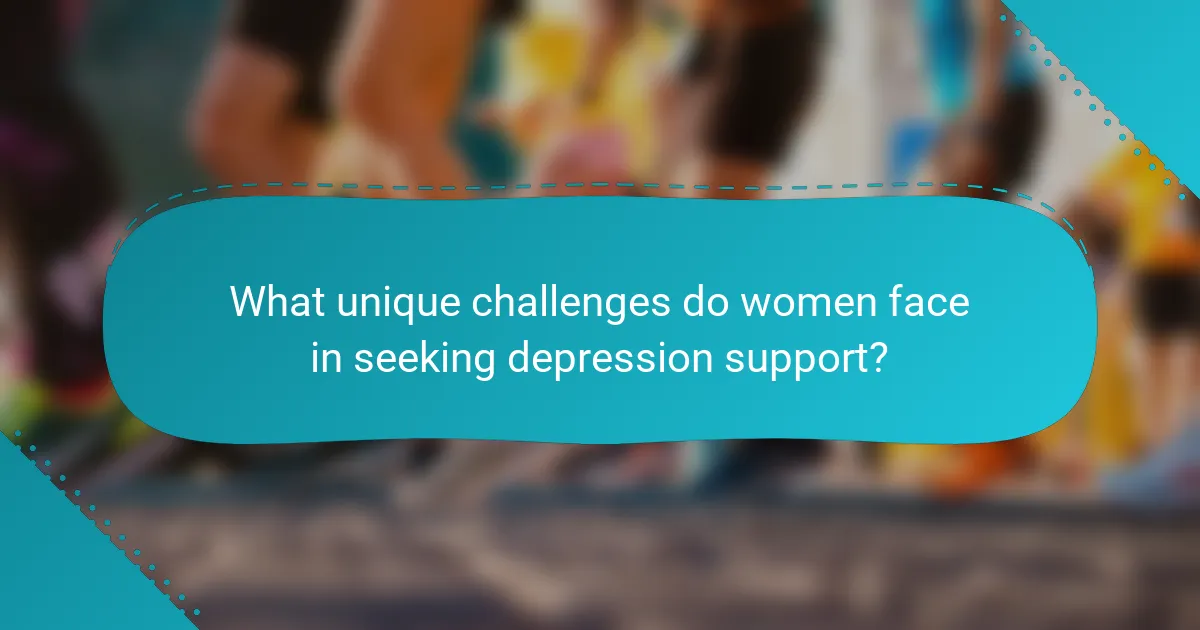
What unique challenges do women face in seeking depression support?
Women face unique challenges in seeking depression support due to societal stigma, lack of tailored resources, and emotional barriers. Many women feel pressure to fulfil caregiving roles, which can lead to neglecting their mental health. Additionally, women often experience different symptoms of depression compared to men, making it difficult to find appropriate support. Research indicates that women are more likely to experience co-occurring disorders, complicating their treatment journey. Community resources designed specifically for women can empower them to seek help and foster connection, enhancing their overall well-being.
How can stigma affect women’s willingness to seek help?
Stigma significantly reduces women’s willingness to seek help for depression. Fear of judgment and misunderstanding often leads to isolation. Many women may avoid discussing their mental health due to concerns about societal perceptions. This reluctance can hinder access to essential support resources, delaying recovery and worsening symptoms. Community initiatives aimed at reducing stigma can empower women to seek help more readily.
What barriers do women encounter in accessing mental health care?
Women face several barriers in accessing mental health care, including stigma, financial constraints, and lack of awareness. Stigma surrounding mental health can deter women from seeking help, as they may fear judgment or discrimination. Financial constraints often limit access to necessary services, especially for those without insurance. Additionally, lack of awareness about available resources and support systems can hinder women from pursuing mental health care. Addressing these barriers is crucial for improving access and support for women dealing with depression.

What are some best practices for supporting a friend with depression?
To support a friend with depression, prioritise active listening, offer emotional validation, and encourage professional help. Create a safe space for open conversations, and suggest engaging in enjoyable activities together. Research local mental health resources to provide additional support.
How can active listening improve support for women in distress?
Active listening significantly enhances support for women in distress by fostering trust and understanding. This approach allows women to feel heard and validated, which is crucial for emotional healing. Studies show that empathetic communication reduces feelings of isolation and despair, promoting a supportive environment. By actively engaging with women’s concerns, support networks can better address their unique needs, leading to improved mental health outcomes.
What are common mistakes to avoid when helping someone with depression?
To support someone with depression effectively, avoid minimising their feelings, offering unsolicited advice, or pushing them to “snap out of it.” Instead, listen actively, validate their experiences, and encourage professional help. Recognising these common mistakes fosters a supportive environment.
What expert insights can enhance understanding of women’s mental health?
Expert insights can significantly enhance understanding of women’s mental health by focusing on tailored strategies for depression support. Research indicates that women experience depression differently, often influenced by hormonal changes and societal pressures. Community resources, such as support groups and mental health organisations, provide essential connections and shared experiences. Self-care techniques, including mindfulness and physical activity, empower women to manage symptoms effectively. These insights underscore the importance of a holistic approach to mental health, emphasizing both individual and communal support systems.
